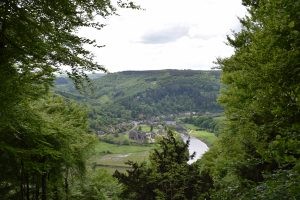Grace Powers
Type of Project: Education Abroad
1. For my STEP Signature Project, I studied abroad with the Public Health Perspectives: Finland and Estonia program sponsored by the OSU Office of International Affairs. This three-week program during May of 2017 exposed me to global public health issues and practices in Finland and Estonia.
2. My view of the world changed as a result of this project as I learned that you cannot really understand a county until you have visited it. With the country of Estonia, for example, I assumed that since it was a part of the Soviet Union in the past, it would have negative health outcomes and a lack of culture. However, I learned that the opposite is true. Estonia’s health outcomes are just about as good as Finland’s and they have an entire rich culture of their own. I would never have known this if I did not have the opportunity to visit the country and experience it for myself. On a personal level, I definitely transformed as a person during this experience. I was challenged to step out of my comfort zone by working within a large group and interacting with people that I did not know. By the end of the experience, I was very comfortable with the people on my trip. I now view myself as a person who can easily adapt to their surroundings and contribute positively to a group.
3. Three key aspects of my STEP Project that led to my transformation are the pre-departure class, in-country site visits, and the people I experienced it all with. During the pre-departure course, Dr. Wallace spent five days giving our class background information about Finland and Estonia. Topics we learned about included historical perspectives, healthcare systems, and contemporary issues in each country. This class allowed me to get a taste of what I would be learning while in the country. Additionally, we were assigned homework every night where we had to work with our classmates to create a presentation for class the next day. I liked the opportunity to get to know my classmates before the trip. As I became more comfortable with the material, my classmates, and my professor I become more excited and prepared for the trip. The pre-departure class definitely set me up on the right path towards my transformation.
While in Finland and Estonia, we not only traveled throughout the countries and visited typical tourist sites, but we also visited other places that gave us a unique “insider” look into life in Finland and Estonia. In Finland, we visited an organic farm, a Finnish family’s home, a public high school, the University of Jyvaskyla, and The National Institute for Health and Welfare. In Estonia, we visited the University of Tartu, the United States Embassy in Tallinn, and e-Estonia. Having the opportunity to visit these sites definitely aided in my transformation. I felt as if I was able to learn more about these countries, and global public health, by visiting these specific places than if I was traveling by myself. I realized that there is a lot more to learn about a country than just its history or population statistics. There are real people in these countries who haves families, friends, homes, jobs, traditions, feelings, etc. I hope that in the future when I travel to different countries or work with diverse populations, I am able to remember this.
Perhaps the aspect of my experience that most contributed to my transformation was the people I shared it with. I am a shy person, so I was nervous to not only be in a new place, but also be with new people. As I pushed myself to start up conversations and ask questions, I realized that it became easier to talk to the people in my group. In fact, I made a few close friends who will always hold a very special place in my heart! Being around fellow Public Health majors was inspiring. I enjoyed hearing about what their plans for the future are and what they loved about the field. Equally as inspiring, however, were the non-public health majors. I loved watching their fascination with public health grow throughout the trip. I hope that whether they become doctors or engineers or whatever else in the future, they always remember the public health perspective. The people I met on this trip gave me confidence and helped me realize that I can be successful in a large group. Additionally, I now understand myself as someone who places a higher value on people than places. Without my Finland and Estonia classmates, my transformation would not have been possible.
4. On a practical level, this project helped me reach my academic goal because it fulfilled my capstone requirement, which is required in my major. However, the transformation I experienced is valuable far beyond this. One of my personal goals for the project was to be able to step outside of my comfort zone. I definitely think I accomplished this goal as I made a lot of new friends who I am excited to see back in Columbus. These friendships would not have been possible without this experience. In the future, I hope to become a public health professional and assist communities by promoting health through research-based programming. Skills that I have learned on this trip, like collaboration and flexibility, as well as the examples of public health initiatives I have witnessed in Finland and Estonia will guide me throughout my career. As I am starting graduate school at The College of Public Health in the fall, this was the perfect culminating experience for my undergraduate career at Ohio State. Thank you to STEP for making it all possible!



















